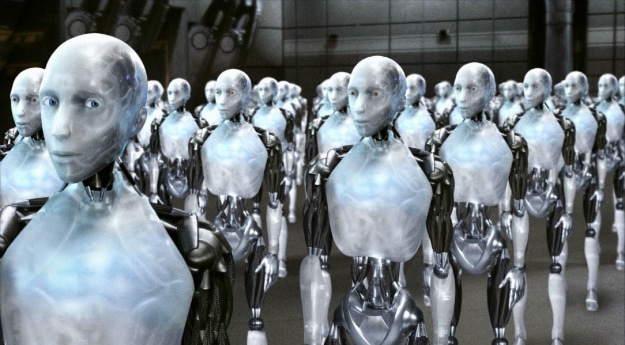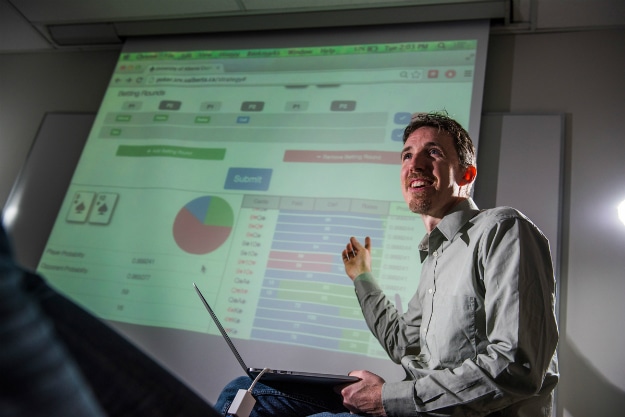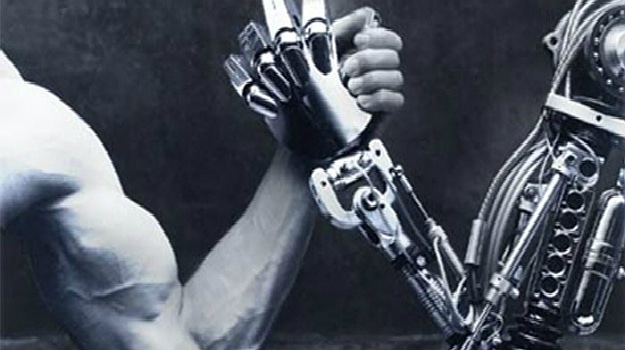The concept of artificial “beings” existing to act as servants and companions is far older than modern science fiction. Artificial people exist in Norse, Jewish, Chinese and Greek mythology dating back to ancient times. Stories of mechanical guardians and beings in the 11th and 12th century are filled with constructs with artificial intelligence abilities which made them seem more suited for 20th-century science fiction. Today, a “machine” like this can be found everywhere in various forms and shapes.
The term “robot” was first used to describe automata in Karel Capek’s 1921 play R.U.R (Rossum’s Universal Robots). In the early 1940s, Isaac Asimov coined the term “robotics”, and his Three Laws of Robotics gave rise to the prevailing notion that robots were not only capable of performing rote labor but also of rising to a level of intelligence above that of their human creators.
CREDIT: [GEEK]
The Science Of AI
Not only has the concept of true artificial intelligence been a staple of books and movies for decades, many believe that the concept of AI beings evolving to a human level is a distinct possibility. The Turing Test was designed to test machine ability to exhibit behavior similar to humans and predicted that at some point in the future it would be difficult to distinguish between man and machine.
Often when interacting with AI such as SILVIA and SIRI, it can seem that the future is not all that far away. While many visions of robots and AI seem to have the ultimate goal of performing menial or dangerous tasks for humans, other programmers have explored the ability of AI to learn complex tasks and compete against humans.
The most famous of the AI competitors is Deep Blue, a chess-playing computer developed by IBM. Deep Blue made history in 1996 by defeating world champion Garry Kasparov in a game and a match, the first computer to do so.
CREDIT: [THE TARTAN]
Deep Blue now resides at the National Museum of American History and the Computer History Museum as an example of the early success of AI. Developers soon moved to software based AI as opposed to hardware-based like Deep Blue. This has led to computers learning to play Civilization and even classic Nintendo games.
AI Takes The Next Step
For many years, AI programmers have attempted to create a program capable of playing against and defeating humans in one of the most complicated games possible: Texas Hold’em poker. Let’s not forget that while the ever-popular chess is a classic, interesting game, it remains a game of set rules and limited possibilities. Poker, however, is a game of incomplete information.
According to a team of programmers from The University of Alberta, they have created a player that can never be beaten by a human player at heads-up Limit Hold’em: Cepheus.
Cepheus’ significance is best understood by understanding the unique attributes of poker.
Poker has long been a popular pastime and is played by tens of millions around the world in home games, casinos and on online sites. Texas Hold’em, like other games, has its basis in mathematical concepts, which is the basis of all computers. However, unlike games such as chess and backgammon, poker is a game of incomplete information.
The fact that Cepheus can compete against human players and win represents a major AI breakthrough. In an article published in Science, Carnegie Mellon’s Tuomas Sandholm wrote: “This is, to my knowledge, the largest imperfect-information game essentially solved to date, and the first one competitively played by humans that has now been essentially solved.”
CREDIT: [HUFFINGTON POST]
In the website devoted to Cepheus the programmers state: [pullquote]“No human player will ever beat Cepheus at heads-up Limit Hold’em.”[/pullquote]
Even poker players and media acknowledged Cepheus’ ability with one site going so far as to write an article suggesting that the computer was about to be sponsored to play Texas Hold’em on Poker Stars. While of course, this was satire, it goes to show how wide reaching Cepheus’ abilities are, as few ever thought that a machine could ever compete with a human.
Why It Matters
This is due to the unique nature of poker, as explained by mathematician and poker player David Skalansky in The Fundamental Theorem of Poker in 1994:
“Every time you play a hand differently from the way you would have played it if you could see all your opponents’ cards, they gain; and every time you play your hand the same way you would have played it if you could see all their cards, they lose. Conversely, every time opponents play their hands differently from the way they would have if they could see all your cards, you gain; and every time they play their hands the same way they would have played if they could see all your cards, you lose.”
Professional and serious poker players will tell you that the goal of poker is not to win pots but to make the correct decisions. Winning poker players are simply the ones that make fewer mistakes than their opponents. Cepheus simply never makes a mistake.
One of the other reasons that Cepheus is the best heads-up poker player in existence is due to the nature of poker. One’s success in poker is measured over the long term. While it is possible to defeat Cepheus in a hand or two, it is impossible to emerge victorious over the long-term.
The database that Cepheus uses is incredibly large. The table of possible permutations of the game (of which there are approximately 3 x 10^14) consists of 11 terabytes of data. In addition to using the data, Cepheus uses basic game theory to make it impossible for the human competitor to make the correct decision.
One of Cepheus co-creators, Neil Birch, describes this concept simply:
“The AI is always dealt either a king or a two, and you are always dealt a queen. The AI will always raise all-in when it holds a king and will do the same 50% of the time when it is dealt a two. You then get to decide whether you should call or fold. What should you do? Since the AI will have a king 67% of the time that it raises you should fold your queen 100% of the time. You can’t call the times that it holds a two because it’s impossible to distinguish between the time the AI raises with a king and a two.”
Cepheus’ strategy is based on playing against itself and learning from its mistakes. Actions that result in a “loss” are seldom, if ever, used in the future.
While Cepheus marks a major AI breakthrough and the latest in a series of victories by machines over humans, the ultimate test for an AI to compete successfully against humans may also be found in the poker world; No-Limit Texas Hold’em, which differs from Limit Hold’em in that the betting amounts are not structured, meaning that players can bet any amount of their choosing, even their entire chip stack. While the mathematics of the game never change, No Limit allows players to control the odds that their opponents face based on their bet sizes, and also allows for the ultimate weapon in the battle of man versus machine: bluffing.
If a future version of Cepheus can be unbeatable in this form of poker, it may well be time to bring out the Turing Test. For now, we can safely say that the battle of man vs machine is still ongoing.




COMMENTS